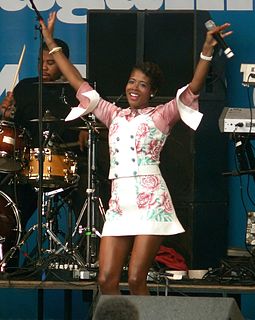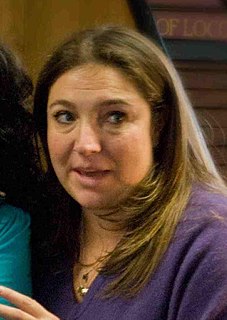A Quote by Kelis
As a child, I'd help my mum cook, and it was ridiculous - she had the correct gadget or utensil for everything. 'Stop! Don't use that, I have exactly the right utensil.' After I left home, I survived on cup-a-meals and never saw myself as being like her. Now I've become her.
Related Quotes
She had said she didn't feel fear, but it was a lie; this was her fear: being left alone. Because of one thing she was certain, and it was that she could never love, not like that. Trust a stranger with her flesh? The closeness, the quiet. She couldn't imagine it. Breathing someone else's breath as they breathed yours, touching someone, opening for them? The vulnerability of it made her flush. It would mean submission, letting down her guard, and she wouldn't. Ever. Just the thought made her feel small and weak as a child.
Eventually she came. She appeared suddenly, exactly like she'd done that day- she stepped into the sunshine, she jumped, she laughed and threw her head back, so her long ponytail nearly grazed the waistband of her jeans. After that, I couldn't think about anything else. The mole on the inside of her right elbow, like a dark blot of ink. The way she ripped her nails to shreds when she was nervous. Her eyes, deep as a promise. Her stomach, pale and soft and gorgeous, and the tiny dark cavity of her belly button. I nearly went crazy.
In her heart she is a mourner for those who have not survived. In her soul she is a warrior for those who are now as she was then. In her life she is both celebrant and proof of women's capacity and will to survive, to become, to act, to change self and society. And each year she is stronger and there are more of her.
For hours she danced and sang and flirted and did this thing that's-she did Marilyn Monroe. And then there was the inevitable drop. And when the night was over and the white wine was over and the dancing was over, she sat in the corner like a child, with everything gone. I saw her sitting quietly without expression on her face, and I walked towards her but I wouldn't photograph her without her knowledge of it. And as I came with the camera, I saw that she was not saying no.
When we want to give expression to a dramatic situation in our lives, we tend to use metaphors of heaviness. We say that something has become a great burden to us. We either bear the burden or fail and go down with it, we struggle with it, win or lose. And Sabina - what had come over her? Nothing. She had left a man because she felt like leaving him. Had he persecuted her? Had he tried to take revenge on her? No. Her drama was a drama not of heaviness but of lightness. What fell to her lot was not the burden, but the unbearable lightness of being.
She had been sharing a house with him for a week, and he had not once flirted with her. He had worked with her, asked her opinion, slapped her on the knuckles figuratively speaking when she was on the wrong track, and acknowledged that she was right when she corrected him. Dammit, he had treated her like a human being.
Will only looked at her. There had been light in his eyes on the stairs, as he'd locked the door, when he'd kissed her--a brilliant, joyous light. And it was going now, fading like the last breath of someone dying. She thought of Nate, bleeding to death in her arms. She had been powerless then, to help him. As she was now. She felt as if she were watching the life bleed out of Will Herondale, and there was nothing she could do to stop it.
I have known her longer, my smile said. True, you have been inside the circle of her arms, tasted her mouth, felt the warmth of her, and that is something I have never had. But there is a part of her that is only for me. You cannot touch it, no matter how hard you might try. And after she has left you I will still be here, making her laugh. My light shining in her. I will still be here long after she has forgotten your name.
Clary closed her eyes. Remembering the way Jace had looked at her the night she'd freed Ithuriel, she couldn't help but imagine the way he'd look at her now if he saw her trying to lie down to die on the sand beside him. He wouldn't be touched, wouldn't think it was a beautiful gesture. He'd be angry at her for giving up. He'd be so--disappointed.
My mother didn't feel sorry for herself, she was left with no child support, no alimony at a very young age, with a child to raise, a high school education and she just figured it out. She didn't complain, she didn't rely upon government, she relied upon her own skill set, her own self confidence, her own drive in moxie and her own duty to me and her and she relied upon her family and her faith.
The idea is that Jodie Foster is with her child and she's going back to New York from Germany with her husband's body. She loses her child on a plane, and you think, 'How can that happen?' There's no record of her having brought a child onto the plane, and the captain is left wondering about whether she's telling the truth. You never really know if she's telling the truth or not.
He felt safe with her. He'd never been safe with another human being, not since he'd been taken as a child from his home. He'd never been able to trust. He could never give that last small piece - all that was left of his humanity - into someone else's keeping. And now there was Rikki. She let him be whatever he had to be to survive. She didn't ask anything of him. There was no hidden motive. No agenda. Just acceptance. She was different - imperfect, or so she thought - and she knew what it was like to fight to carve out a space for herself. She was willing for him to do thar.
Selfishly, perhaps, Catti-brie had determined that the assassin was her own business. He had unnerved her, had stripped away years of training and discipline and reduced her to the quivering semblance of a frightened child. But she was a young woman now, no more a girl. She had to personally respond to that emotional humiliation, or the scars from it would haunt her to her grave, forever paralyzing her along her path to discover her true potential in life.



































